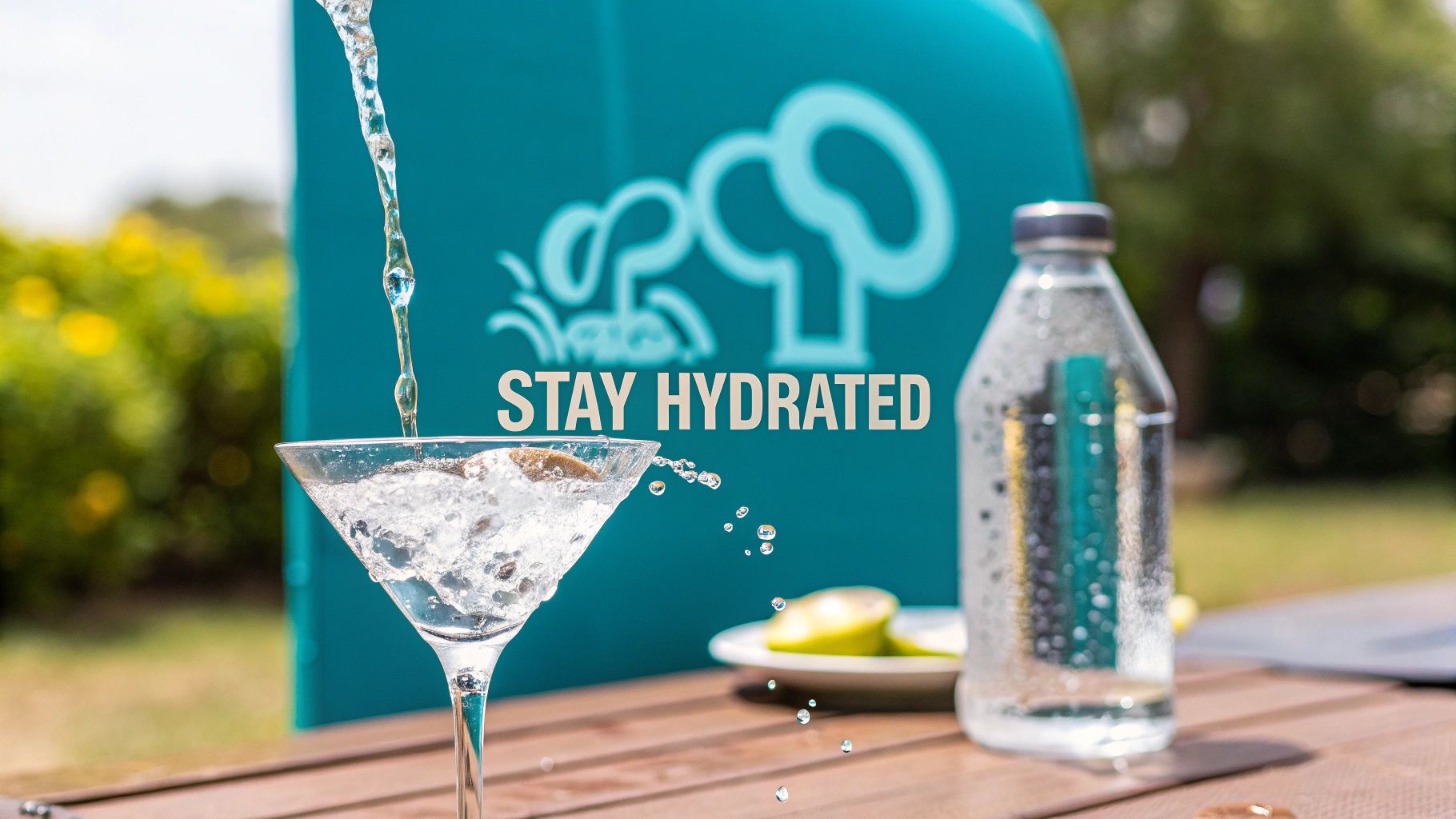

· By Annemarie
Why Alcohol Dehydrates You And How To Prevent It
Ever find yourself wondering why just a few drinks can leave you feeling completely parched and worn out? The short answer is that alcohol acts as a diuretic, which is just a scientific way of saying it makes you pee more often. It does this by messing with a key hormone that signals your body to hang onto water, essentially tricking your kidneys into flushing out more liquid than you're actually drinking.
So, Why Does Alcohol Actually Dehydrate You?
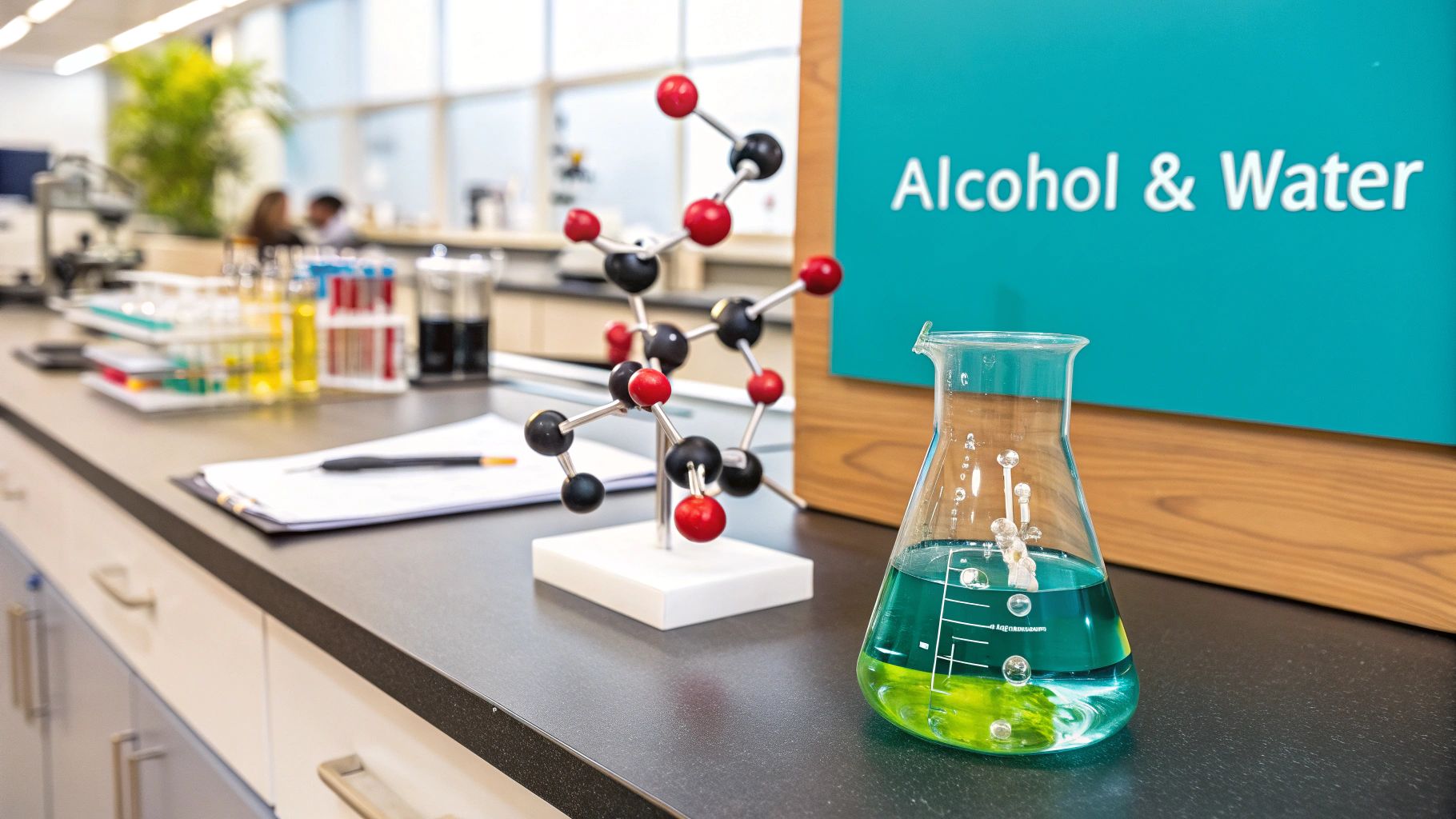
Waking up with a sandpaper-dry mouth and a throbbing headache after a night of drinking isn't just bad luck. It’s the direct consequence of how ethanol—the kind of alcohol in your favorite beer, wine, or cocktail—interferes with your body's finely tuned water management system.
Even though you're drinking a liquid, the alcohol it contains kicks off a process that results in a net fluid loss. Getting a handle on this process is the secret to having a good time without paying for it the next day. It all comes down to a crucial hormone called vasopressin, also known as antidiuretic hormone (ADH).
Think of vasopressin as your body's own internal dam operator. Its main job is to keep your water levels stable by telling the kidneys to reabsorb water back into your system. When alcohol enters the picture, it essentially tells this operator to take an unscheduled break.
When you have a drink, the alcohol suppresses the release of vasopressin. Without that critical signal, your kidneys don't get the message to hold onto water. Instead, they start sending that fluid straight to your bladder. This is the real reason you find yourself making so many trips to the bathroom during a night out.
The Dehydration Domino Effect
This hormonal meddling starts a domino effect that goes way beyond just losing water. With every trip to the restroom, you’re not just flushing out fluid; you're also losing essential electrolytes like sodium and potassium. This is a critical piece of the puzzle that many people miss when thinking about why alcohol dehydrates you.
To give you a clearer picture, here’s a quick summary of how alcohol can throw your body off balance.
How Alcohol Triggers Dehydration At A Glance
This table breaks down the main ways alcohol disrupts your fluid balance, giving you a quick reference for what’s happening inside your body.
| Mechanism | What Happens In Your Body | The Result |
|---|---|---|
| Hormone Disruption | Alcohol reduces the release of vasopressin (your anti-diuretic hormone). | Your kidneys don't get the signal to reabsorb water. |
| Kidney Overdrive | Without vasopressin, your kidneys filter less water back into your system. | More water is sent directly to your bladder. |
| Increased Urination | You start urinating far more frequently than you normally would. | You begin losing more fluid than you're taking in. |
| Electrolyte Loss | Each trip to the bathroom flushes out vital minerals like potassium and sodium. | Your body's electrolyte balance is thrown off, worsening symptoms. |
This cascade of events is precisely why you experience those classic hangover symptoms, from dizziness and fatigue to a pounding headache. It all starts with that simple fluid deficit.
By getting to know this biological process, you can be more proactive in managing its effects and wake up feeling a whole lot better. You can dive even deeper by checking out this guide on how alcohol dehydrates you.
How Alcohol Outsmarts Your Brain And Kidneys
Ever wonder why a night of drinking leads to so many trips to the bathroom? The secret lies in a fascinating, and slightly sneaky, conversation between your brain and your kidneys. The main character in this story is a hormone called vasopressin, more formally known as Antidiuretic Hormone (ADH).
Think of ADH as your body’s internal "water conservation manager." Its entire job is to keep you perfectly hydrated.
Your brain’s pituitary gland releases ADH to send a critical message to your kidneys, telling them to hold onto water by reabsorbing it back into your system. This is how you stay balanced. But when alcohol shows up, it acts like a communication jammer, directly interfering with your brain and suppressing the release of ADH.
With the water manager suddenly taken offline, your kidneys never get the "save water" memo. Instead, they get a new, misleading order to do the exact opposite: flush out fluids. This hormonal disruption is the main reason you find yourself urinating so much more when you drink, kicking off the whole dehydration process.
This infographic breaks down that simple but powerful chain reaction.
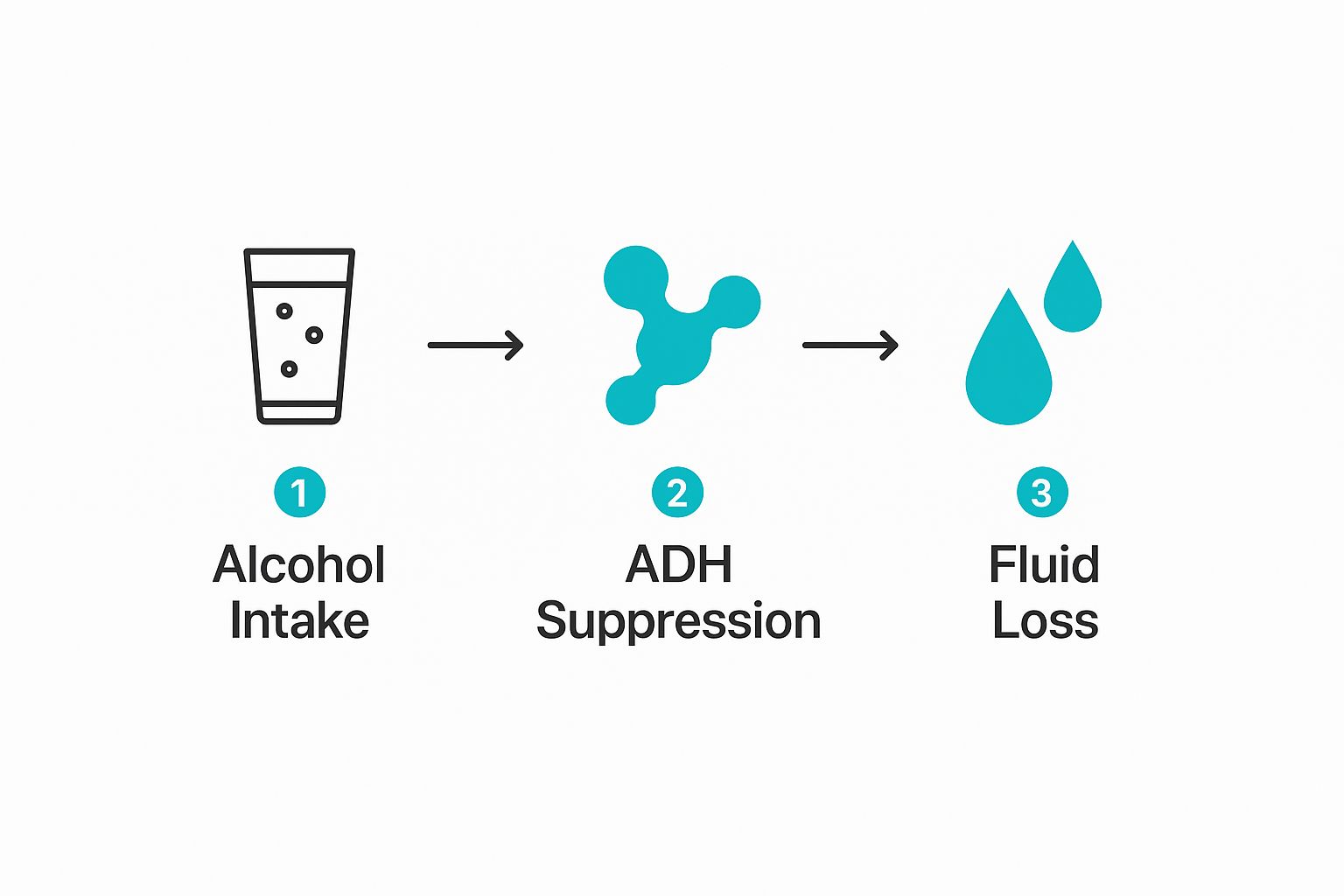
As you can see, the moment alcohol enters the picture, ADH levels drop, and your kidneys start working overtime to get rid of water.
The Nuance Behind The Diuretic Effect
But here's where it gets interesting—the story isn't quite that simple. For over 80 years, researchers have been digging into this, and the evidence is more subtle than you’d think. For example, studies show that a standard drink can make you produce about 300–600 mL more urine than if you drank the same amount of water.
That diuretic effect, however, doesn't last all night. The biggest spike in urine output usually happens within the first 20-30 minutes after you start drinking. After that initial surge, your urine production tends to go back to normal, even if you keep drinking and your blood alcohol level stays high. If you're curious, you can learn more about the research on alcohol's complex relationship with hydration.
This means that while the first drink or two really opens the floodgates, the drinks that follow have a much smaller impact on fluid loss. The real dehydration risk often comes from drinking alcohol—especially high-proof spirits—without sipping on water or other non-alcoholic drinks to make up for the initial loss.
Breaking Down The Hormonal Hijacking
This communication breakdown between your brain and kidneys is at the heart of the dehydration equation. Let's walk through exactly what happens when your body gets hijacked.
- Normal State: When you’re well-hydrated, your brain keeps a steady release of ADH going, making sure your kidneys hang on to just the right amount of water.
- Alcohol Enters: You have a drink. The alcohol moves from your digestive system into your bloodstream and makes a beeline for your brain.
- Hormone Suppression: Once there, the alcohol directly messes with the pituitary gland, causing it to dramatically slow down or even stop releasing ADH.
- Kidney Response: Without those ADH signals, the tiny collecting ducts in your kidneys become less able to reabsorb water.
- Fluid Loss: As a result, way more water gets sent straight to your bladder to be flushed out as urine.
This hormonal takeover is a primary reason why alcohol is so dehydrating and plays a huge role in the headache, fatigue, and intense thirst you might feel the next day. It’s not just about the volume of what you're drinking, but how that drink tricks your body into ditching more fluid than it should.
Does The Type Of Drink Affect Dehydration?
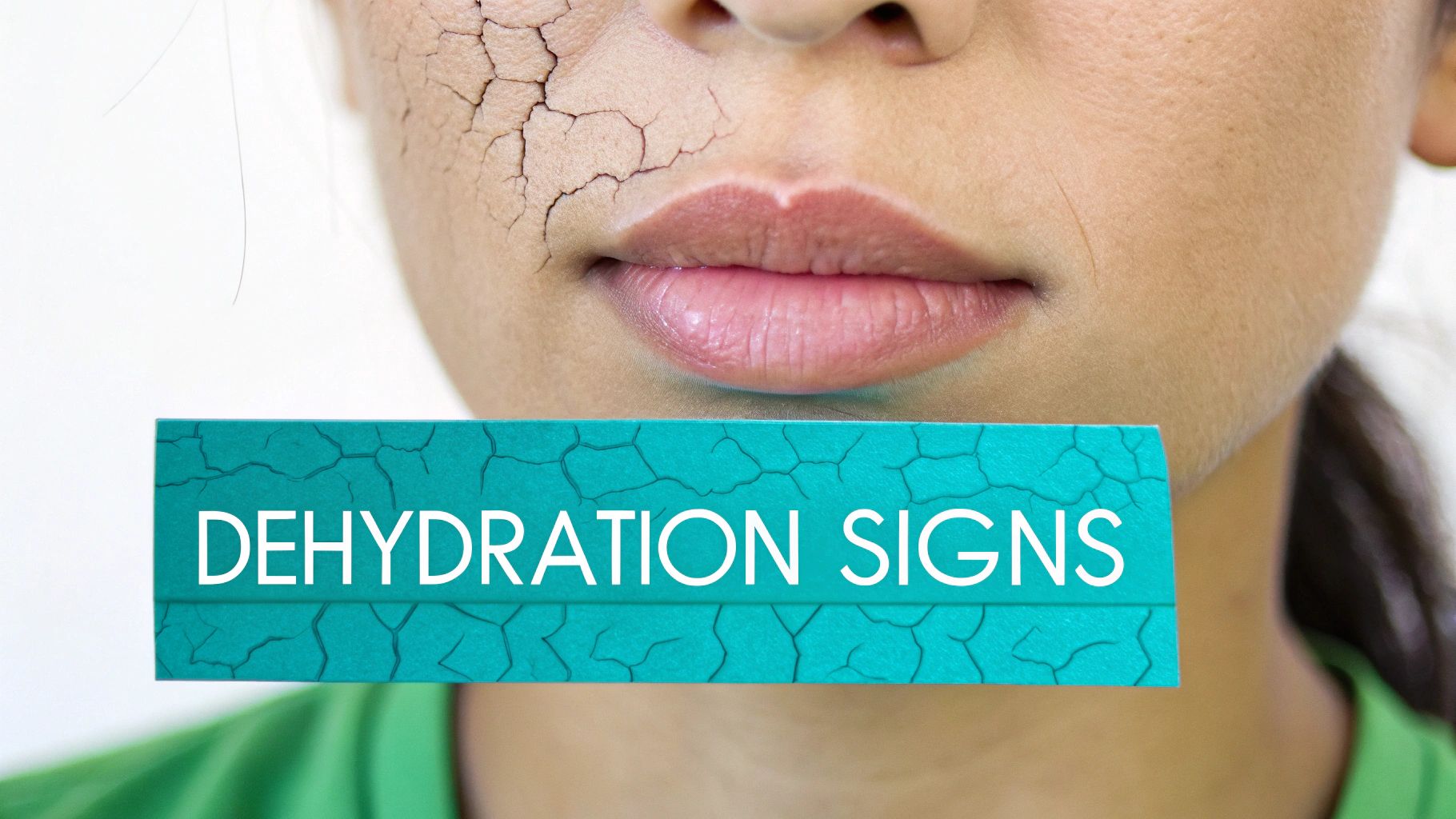
When you’re thinking about why alcohol makes you so thirsty, it’s worth remembering that not all drinks are created equal. The type of beverage you choose actually plays a huge role in how much fluid your body ends up losing. It all boils down to two main things: the alcohol concentration (or proof) and the total liquid volume of what you're drinking.
Think of it like a tug-of-war. Every alcoholic drink has dehydrating ethanol on one side and hydrating water on the other. If you're sipping something with low alcohol content and a lot of water, like a light beer, the water you're taking in can help offset some of what you'll lose. The diuretic effect is still there, for sure, but it’s a lot less aggressive.
Now, flip that around. A shot of high-proof liquor like vodka or whiskey is packed with alcohol and has very little water. In that case, there just isn't enough liquid in the glass to make up for the serious diuretic effect it kicks off. This is exactly why sipping on straight spirits is far more dehydrating than a low-alcohol beer or a wine spritzer.
Alcohol By Volume and Its Impact
Your best cheat sheet for figuring out a drink’s dehydrating power is its alcohol by volume (ABV). A higher ABV sends a stronger signal to your brain to hit the brakes on vasopressin, which leads to more trips to the bathroom. This pretty much creates a pecking order for which drinks will dry you out the most.
- Low-Alcohol Drinks (like light beer): These guys have a minimal net dehydrating effect. Why? Because the amount of water in the drink almost balances out the fluid you lose.
- Standard-Alcohol Drinks (like regular beer or wine): This is where you start to see a net fluid loss. The alcohol's diuretic strength begins to overpower the amount of liquid you're consuming.
- High-Alcohol Drinks (like spirits and strong cocktails): These are the ones to watch out for. They deliver a powerful diuretic punch with very little water to soften the blow.
But here’s the real kicker: the total volume of alcohol you drink usually matters more than the specific type of drink. Downing five beers will ultimately be more dehydrating than a single glass of wine, simply because you're taking in more total ethanol.
The Myth of Post-Workout Rehydration
This all becomes especially important when you’re trying to rehydrate after a workout. Your body is already down on fluids from sweating, and the alcohol content of your drink can seriously mess with your recovery.
Research has shown that drinks with up to 2% alcohol (think a very, very light beer) don’t really hurt your rehydration efforts compared to plain water. But once you get into drinks with a higher ABV, like a standard 4% or 5% beer, they can actually delay your body from getting its fluid balance back to normal.
If you want to get into the weeds, you can explore the full findings on rehydration and alcohol yourself. The bottom line? Grabbing a regular beer after a tough gym session is a pretty bad way to rehydrate—it actively works against what your body is trying to do.
Recognizing The Signs Of Alcohol-Induced Dehydration
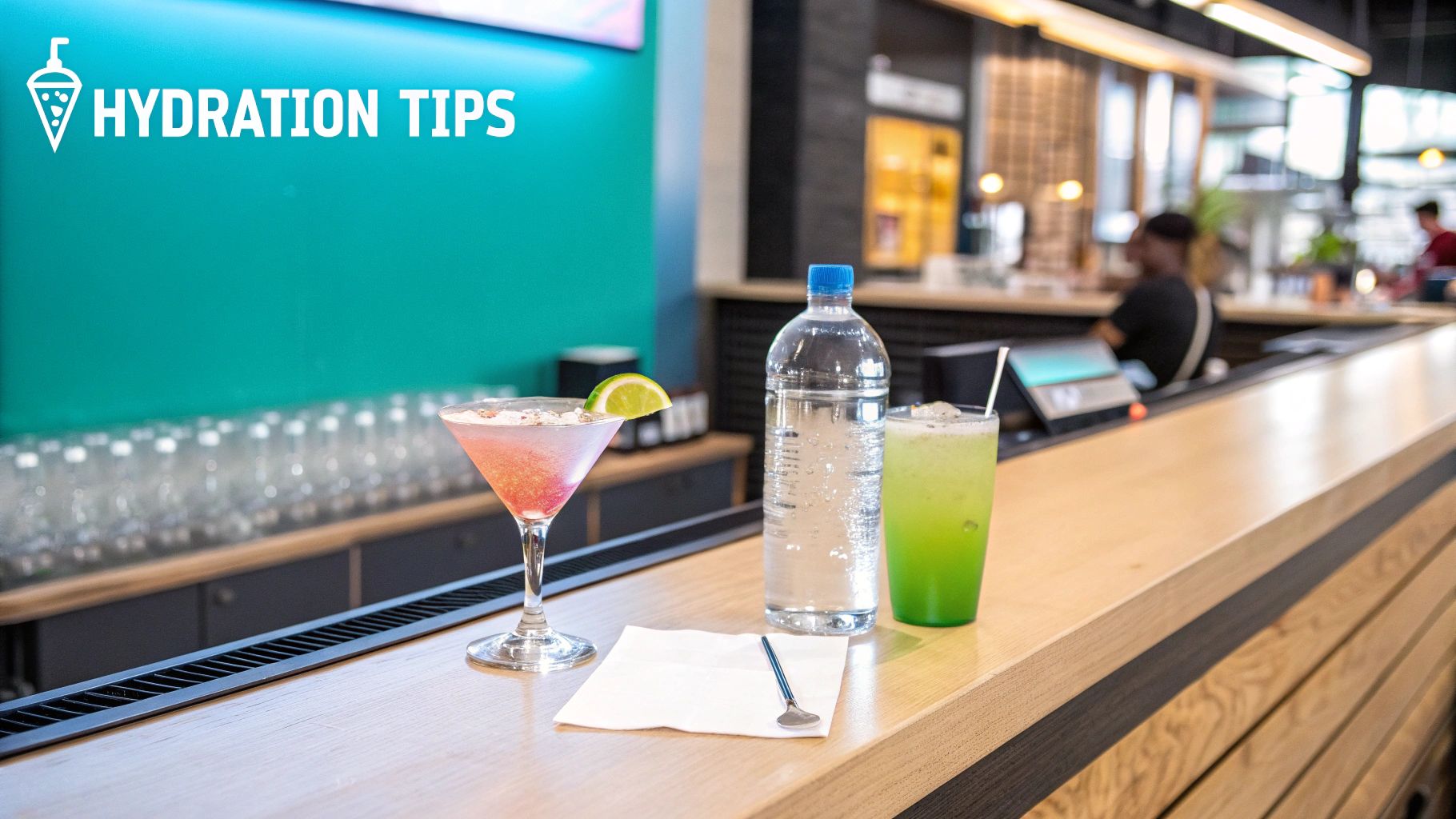
We’ve all been there. That dreaded morning-after misery we automatically label a "hangover" is often just your body screaming for water. In reality, a lot of those classic hangover feelings are the direct results of dehydration, just wearing a clever disguise.
Learning to recognize these tell-tale signs is your first step toward getting ahead of the misery and feeling human again, faster.
When your body loses more fluid than you're putting back in, every single system feels it. Those symptoms? They're your body's version of an SOS signal, a desperate plea for immediate rehydration. If you ignore them, you're just prolonging the pain. But if you listen, you can seriously shorten your recovery time.
A pounding headache after a night out isn't some random punishment. It’s a physical response to fluid loss. When your body gets dehydrated, your brain can literally shrink away from your skull, which is what triggers the pain receptors in the membrane around it. Ouch.
Once you understand the "why" behind each symptom, it's way easier to connect the dots between that last drink and how awful you feel right now.
Key Symptoms And What They Really Mean
Each one of these signs tells a specific story about what's going on inside your body. Spotting them early lets you give your body what it needs before the worst of the hangover really digs its claws in.
Here are the most common red flags to watch out for:
- Pounding Headache: This is the big one. It's often caused by that temporary brain shrinkage from fluid loss we just talked about, mixed with funky changes in blood flow to your brain.
- Persistent Thirst and Dry Mouth: This is your body's most obvious cry for help. It’s a direct signal that your fluid reserves are hitting critical levels and need to be topped up, pronto.
- Fatigue and Weakness: Dehydration makes your heart work overtime to pump blood. Plus, a lack of fluid messes with muscle function, leading to that heavy, completely drained feeling.
- Dizziness or Lightheadedness: When your fluid volume drops, so does your blood pressure. This is what makes you feel unsteady or dizzy, especially when you stand up a little too fast.
- Dark-Colored Urine: This is one of the clearest visual cues you can get. If your pee is a concentrated, dark yellow, it means your kidneys are desperately trying to hold onto every last drop of water because there just isn't enough to spare.
These symptoms are way more than just an inconvenience; they're your body's built-in feedback system. Listening to these signals and rehydrating with water and electrolytes is the best way to fight back against the effects and get back on your feet.
Simple Strategies To Stay Hydrated While Drinking
Enjoying a night out doesn’t have to mean writing off the next morning. It really is possible to have a good time and wake up feeling human. The secret isn't complicated—it's just about being proactive and giving your body a little support while you’re drinking.
One of the simplest and most effective tricks in the book is the one-for-one rule. It's easy: for every alcoholic drink you have, follow it up with a full glass of water. This single habit directly tackles alcohol's diuretic effect by replacing fluids as you lose them. Plus, it helps dilute the alcohol in your system, taking some pressure off your body.
Choose Your Drinks Wisely
Believe it or not, what's in your glass can make a huge difference. As we've covered, not all drinks are created equal when it comes to dehydration. A smart move is to stick with drinks that have a lower alcohol concentration, simply because they contain more water to begin with.
- Low-Alcohol Options: A light beer or a wine spritzer is a much gentler choice than a shot of a high-proof spirit.
- Avoid Sugary Mixers: That rum and coke might taste good, but drinks loaded with sugary sodas or juices can make dehydration even worse. Your body has to use up extra water just to process all that sugar.
Science actually backs this up. One study looked at how different drinks rehydrated people who were already dehydrated. The results were telling. After five hours, those given a 5% alcohol beer only held onto 21% of the fluid. Compare that to the water or low-alcohol beer drinkers, who retained around 36%.
The researchers also saw that just one hour after drinking the 5% beer, people’s urine output was nearly three times higher than it was with a sports drink. It’s a perfect illustration of how quickly stronger drinks can flush fluids right out of you and slow down your recovery.
The Power of Pre-Hydration and Food
Your game plan should start hours before you even think about ordering your first drink. If you know you've got a night out planned, make a point to drink plenty of water all day long. Walking into the evening fully hydrated gives you a much-needed buffer against the fluid loss that's coming.
And please, never drink on an empty stomach. Food, especially meals with some protein and healthy fats, acts like a brake, slowing down how quickly alcohol hits your bloodstream. This gives your body more time to process everything and lessens the immediate shock to your system.
When you put these tactics together—alternating with water, picking smarter drinks, hydrating beforehand, and eating a good meal—you build a pretty solid defense. These small, mindful choices are the key to finding that sweet spot between a fun night and a functional morning.
For a more detailed recovery plan, you can also check out our guide on the best way to rehydrate after drinking.
Common Questions About Alcohol And Dehydration
Even when you get the science behind how alcohol messes with your body's hydration, there are always a few lingering questions. Let's dig into some of the most common ones people ask.
Getting these details sorted out can be the difference between a rough morning and waking up feeling surprisingly okay.
Does Drinking Water While Drinking Alcohol Actually Help?
Yes, absolutely. This isn't just an old wives' tale; it's one of the simplest and most effective things you can do. The "one-for-one" rule—that is, having a glass of water for every alcoholic drink—is popular for a very good reason. It works.
Think of it as fighting fire with fire, or in this case, fighting fluid loss with fluid replacement. Every glass of water you drink directly pushes back against alcohol's diuretic effect, helping to replace what your kidneys are flushing out. It also dilutes the alcohol in your system, which can slow down how fast your body absorbs it. This gives your system a fighting chance to process everything without getting totally overwhelmed, which is a huge step in preventing severe dehydration.
By keeping up with fluid loss in real-time, you're not just staying hydrated. You’re also easing the burden on the hormones that manage your body's water balance. This simple habit is a total game-changer for avoiding the worst parts of a hangover.
Are Some People More Prone To Dehydration From Alcohol?
Definitely. The way alcohol dehydrates you is incredibly personal. It’s not a one-size-fits-all situation, and a bunch of factors can make you more likely to feel its effects.
Your own biology plays a massive part in why one person feels fine after a couple of drinks while another is already feeling parched. Some of the key variables include:
- Body Weight and Composition: Someone with a lower body weight or less muscle mass will usually end up with a higher blood alcohol concentration (BAC) from the same drink. A higher BAC can ramp up the diuretic effect.
- Sex: Because of general differences in body composition and the enzymes that break down alcohol, women often get a higher BAC than men from the same amount of booze. This can lead to losing more fluid.
- Baseline Hydration: This one’s a biggie. If you start drinking when you’re already a bit dehydrated—say, after a tough workout or a hot day—the effects will hit much harder. Your body simply doesn't have any fluid reserves to spare.
- Genetics and Metabolism: We all have slight differences in the enzymes that process alcohol, and this can change how strongly your body reacts and how quickly it gets dehydrated.
Do Electrolyte Drinks Help More Than Water After Drinking?
They can be, especially after a night of more than just a couple of drinks. Water is fantastic for restoring the sheer volume of fluid you've lost, but alcohol doesn't just get rid of water. It also takes essential minerals called electrolytes with it.
These minerals—like potassium, sodium, and magnesium—are critical for pretty much everything, from your nerves firing correctly to your muscles contracting. That shaky, weak, or foggy feeling you get with a hangover? A big part of that is due to lost electrolytes. An electrolyte drink tackles the problem from two sides: it rehydrates you with fluid and restocks those vital minerals. This two-pronged attack can help you kick symptoms like muscle weakness and brain fog way faster than water alone.
How Much Water Should I Drink To Counteract Alcohol?
The "one-for-one" rule is your best bet to start with. Seriously, try to have one full glass of water for every beer, cocktail, or glass of wine. It's a proactive strategy that helps you stay on top of hydration all night instead of desperately trying to play catch-up when it's too late.
Another great habit? Chug a big glass of water—maybe 16-20 ounces—right before you go to bed. This gives your body a head start on rehydrating while you sleep. Sure, waking up in the middle of the night to drink water is a pain, but this preemptive move gives your body the resources it needs to start the recovery process right away. To really get ahead of it, it helps to understand what causes hangovers in the first place.
Don't let the fear of a rough morning hold you back. Upside offers a smart, easy way to support your body's recovery. Our on-the-go jelly sticks are packed with natural ingredients designed to help you bounce back faster. Enjoy your night and wake up feeling your best by visiting https://enjoyupside.com.
